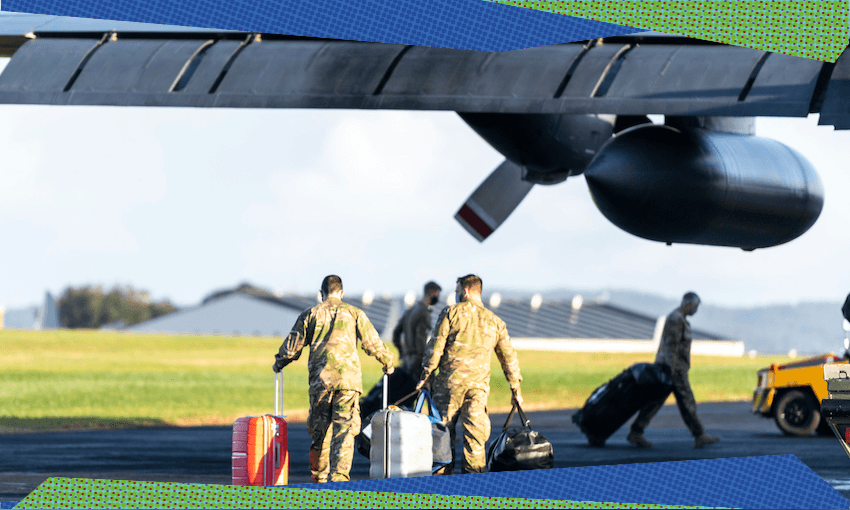The government says sending our defence force to the Red Sea isn’t connected to our stance on Israel killing over 25,000 Palestinians, but an expert in international relations says simply saying it doesn’t make it so.
Yesterday, when the government confirmed plans to deploy six members of our defence force to defend commercial ships against Houthi attacks in the Red Sea, foreign affairs minister Winston Peters said, “Any suggestion our ongoing support for maritime security in the Middle East is connected to recent developments in Israel and the Gaza Strip, is wrong.”
“Well, that’s what he may think, and the government may want to believe that, but that’s not how it’s going to be seen,” says Robert G Patman, professor of international relations at the University of Otago. “The events are much more closely connected than the government is indicating.”
New Zealand has twice voted for a ceasefire in Gaza at the UN General Assembly, but Patman says sending the NZDF to engage in military action in the Red Sea appears to be in contradiction with that stance. Already our response to the Israel-Hamas war has been fractured, and the deployment complicates it further.
The Houthi in the Red Sea are part of a political and military organisation which now controls much of Yemen. They say their attacks on ships are being carried out in solidarity with Palestinians. While leaders have said the attacks will end as soon as “Israeli aggression” in Gaza stops, they have also stated that all US and UK interests in the Red Sea region are legitimate targets. There have been no casualties from their attacks, yet the US and UK, who New Zealand will be joining, have retaliated with large scale military strikes. The Houthi seem undeterred, instead saying it is a sign their attacks are having an impact.
“The Houthi is, whether we like it or not, responding to the failure of the international community to stop the unrelenting military campaign by Israel in Gaza,” says Patman. For three months, the world has watched Israel respond disproportionately to the Hamas attacks on October 7, acting outside the framework of international and humanitarian law. In the Middle East, that is causing outrage, he says. “You could argue that the principal cause of tension in the Middle East at the moment is the absence of a ceasefire in Gaza.”
There is another entanglement too. By going to defend the cargo ships, we join the US. The very same US, of course, that three times vetoed the UN resolutions for ceasefire that we supported. In a shared statement the US and UK governments said, “We will not hesitate to defend lives and the free flow of commerce in one of the world’s most critical waterways”. The disruptions in the Red Sea have already caused the price of oil and shipping goods to rise, something which in an election year, is likely motivating US president Joe Biden, says Patman. Instead of asking the US to reconsider its stance against the ceasefire in order to obtain peace, “we’re supporting their efforts to contain the fallout that’s coming from the Gaza conflict.”
The contradictions of the New Zealand government’s international relations already have been noted internally. New Zealand historically has a bipartisan approach to foreign affairs but in this decision Luxon said the opposition were not consulted, though Labour were briefed on the announcement before it was made public. This morning Labour foreign affairs spokesperson David Parker told RNZ the party had expressed its opposition to the deployment and “we let them know it has shades of Iraq,” a conflict that the then Labour government kept New Zealand out of. Sending personnel to the Red Sea isn’t just about the current conflict but also the risk of becoming involved in the longer term civil war in Yemen, Parker said. “We don’t think it will resolve the problems in the Middle East, which stem from civil war [and] other conflicts in the region, including in Gaza.”
The Green Party has also released a statement on the deployment. “It seems inconceivable for this government to be so dangerously naïve to say that this deployment has nothing to do with the horrific violence that continues to suffocate Gaza,” said co-leaders James Shaw and Marama Davidson. They said they were “deeply disturbed” and “horrified” by the decision, and that New Zealand had a proud history of being a voice for peace, which at present should be “loud and strong” and focused on the de-escalation of violence.
Te Kuaka, a New Zealand foreign policy group, was “deeply alarmed” by the announcement. The group’s co-director Dr Arama Rata said: “New Zealand’s involvement in the Red Sea will just inflame regional instability and cause more civilian deaths without addressing the root cause of the Houthi actions, which is ending the genocide in Gaza.” Te Kuaka is also concerned that the decision was made without a parliamentary mandate, and without explicit authorisation of military action by the UN Security Council. Co-director Dr Marco de Jong also believes the action runs contrary to public opinion, which polls and weekly protests show to be in support of calling for a permanent ceasefire in Gaza.
Social justice groups are chiming in too. Dayenu: New Zealand Jews Against Occupation are calling for people to contact Peters, Luxon and defence minister Judith Collins to “let them know that military action in Yemen does NOT represent us”. Posters advertising the weekly rallies calling for ceasefire that have continued weekly for three months have added “Hands off Yemen”. Meanwhile Valerie Morse of Wellington Peace Action has criticised the “astonishing hypocrisy” of the NZDF deployment. “The double standards of this government in relation to Gaza are breathtaking, and people can see all of it,” Morse says. “They can see that claims about supporting international law and ‘peace and security’ are blatantly hollow.” She says that supporting South Africa’s case against Israel at the International Court of Justice, expelling the Israeli ambassador, instituting a boycott of Israeli goods, and welcoming all Palestinian refugees would be better ways to pursue “peace and justice”. These are the solutions that have been discussed at the weekly rallies alongside a lasting ceasefire.
Peters justified the deployment as a “continuation of New Zealand’s long history of defending freedom of navigation both in the Middle East and closer to home.” He said the Houthi attacks against the ships are “illegal, unacceptable and profoundly destabilising.”
Patman says New Zealand’s international relations are “based on principles and rules, not power”. We like to stand behind international law, and so given that the Houthi attacks do not abide by that, it isn’t necessarily out of character that we should work to try to stop them. The problem is that at the moment “we seem to be quite selective about the international laws that we want to see observed.” Not only is sending NZDF to the Red Sea in contradiction to NZ’s stance on Israel-Gaza, the reasoning behind it is inconsistent – if we are concerned about laws being broken in the Red Sea, we should also be concerned about laws being broken in Gaza, Patman says. “My view is if we are committing ourselves to beef up security against Houthi attacks, that should be coupled with a renewed demand for a ceasefire in Gaza.”





